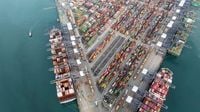In a turbulent economic landscape marked by a renewed trade war, European companies operating in China are finding ways to navigate the storm. A recent survey reveals that while most of these firms have managed to limit direct damage from the ongoing trade tensions, they acknowledge that the business environment has become increasingly challenging in 2025.
As of May 8, 2025, the survey indicates that European firms in China are adapting to the new realities imposed by the trade war. Despite the difficulties, many companies have successfully mitigated the immediate impacts of tariffs and other trade barriers. However, the majority of respondents conceded that the overall business climate has deteriorated this year, reflecting a growing concern among businesses about future operations.
This trade war, which escalated with tariff announcements in early April, has had profound effects on global markets. Initially, the S&P 500 index suffered a sharp decline of more than 12% within a week of the new tariffs being imposed. As the dust settled, equity markets began to recover, with most trading losses from April being recouped by early May. The VIX index, which measures market volatility, surged to levels not seen since the pandemic but has since stabilized in the low 20s, hovering just above the 25-year average of 19.8.
While the immediate impacts of the trade war have been somewhat contained, the underlying economic indicators suggest that the U.S. economy is not yet out of the woods. Preliminary estimates show that GDP contracted by 0.3% in the first quarter of 2025, largely attributed to a significant drag from net exports, which subtracted 4.8 percentage points from growth. This contraction is a direct consequence of the sudden changes in trade policy that have left many businesses scrambling to adjust.
Interestingly, the first quarter also saw a surge in equipment investment, which rose at an annualized pace of 22.5%. This spike was driven by increased spending on aircraft and computer products, as businesses rushed to stock up on essential supplies ahead of anticipated tariffs. This behavior illustrates how companies are attempting to front-load their inventory to mitigate future disruptions.
Looking ahead, experts predict a bumpy ride for GDP growth throughout the remainder of the year. With domestic demand expected to decline and net exports providing only a modest lift, the forecast anticipates an 'air pocket' in consumer and business spending, particularly in the third quarter. This period may see an outright decline in GDP growth, raising concerns about the potential for a recession.
As the labor market shows early signs of moderation, analysts expect this trend to slow to a standstill by late summer, with a rising unemployment rate anticipated by year-end. This scenario echoes the last time Federal Open Market Committee (FOMC) policymakers faced similar conditions, leading to a reduction in the fed funds rate by a total of 100 basis points over three meetings at the end of September 2024. The current forecast suggests a similar trajectory, with the top end of the fed funds rate expected to drop to 3.50% in the latter half of 2025.
Despite these challenges, the effective tariff rate is projected to decrease to about 15%, which could provide some relief to businesses navigating the complexities of international trade. However, the uncertainty surrounding trade policies continues to loom large, making it difficult for firms to plan their strategies effectively.
In the face of these challenges, European companies in China are finding ways to adapt, but the road ahead remains fraught with uncertainty. The trade war's impact is just beginning to unfold, and as firms recalibrate their operations, they must also contend with shifting consumer behaviors and economic conditions.
As the situation develops, it will be crucial for businesses to stay agile and responsive to changes in the market. The resilience shown by many European firms thus far may serve as a foundation for navigating the complexities of the trade landscape in the months to come.
In conclusion, while European companies in China have managed to limit the immediate impacts of the trade war, the increasing challenges they face signal a need for strategic adaptability. With a turbulent economic environment ahead, these firms must remain vigilant and responsive to the evolving landscape.




